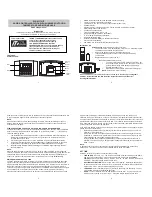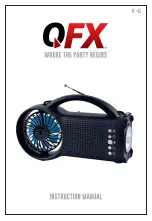
458122/B
23
Safety features
The transponder has a safety valve for releasing pressure that might build up inside.
Pressure relief valve
The transponder is fitted with a pressure relief valve at the bottom of the unit. The
relief valve prevents overpressure. This valve will release the pressure if it exceeds
approximately 1.0 bar.
The relief valve will normally pop out gently releasing the pressure. The valve is reset
by firmly pushing the valve back in and is levelled with the surrounding surface.
Resetting the valve can in certain cases be obstructed due to production of acids and salts
leaking from a damaged battery. In such cases the battery and circuits may have been
damaged. Please contact Kongsberg Maritime for assistance.
Handling a transponder with an open relief valve or heated body
If the transponder body is hot when recovered, place the transponder fully submerged
in a bucket of water for 24 hours or deploy into the sea permanently. If this method is
impossible, the transponder can be cooled with lots of cold water using a fire hose.
If the transponder pressure relief valve emits gas or liquids when recovered, place the
transponder fully submerged in a bucket of water for 24 hours or deploy into the sea
permanently. If this method is impossible, the transponder can be cooled with lots of
cold water using a fire hose.
Charging the battery (on-deck)
Charging a battery is a process with an inherent risk so check applicable procedure(s)
prior to charging in order to first assess the level of the inherent risk; and then, if
necessary, apply suitable controls to mitigate the inherent risk before charging. Follow
the charging procedure carefully.
Context
The battery must be fully charged before long term storage and it is recommended
to recharge the battery every 6 months to make sure the battery does not discharge
completely over time. A completely discharged battery will not charge, as all lithium
ion batteries.
To comply with regulations for air transportation, the battery must have 30 % or less
remaining capacity.
The battery charger will only start to charge if the battery capacity is lower than 96 %.
Summary of Contents for cNODE MiniS LF
Page 1: ...458122 B September 2022 Kongsberg Maritime AS cNODE MiniS LF Transponder Instruction Manual ...
Page 34: ...34 458122 B cNODE MiniS 17 180 Ti dimensions cNODE MiniS LF Instruction Manual ...
Page 35: ...458122 B 35 cNODE MiniS 17 S Ti dimensions Drawing file ...
Page 36: ...36 458122 B TDR50V St dimensions cNODE MiniS LF Instruction Manual ...
Page 37: ...458122 B 37 TDR50V Ti dimensions Drawing file ...
Page 38: ...38 458122 B Transducer guard dimensions cNODE MiniS LF Instruction Manual ...
Page 39: ...458122 B 39 Floating collar dimensions Drawing file ...
Page 56: ... 2022 Kongsberg Maritime ...
















































